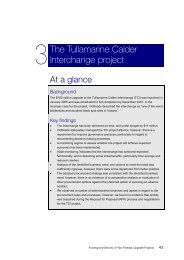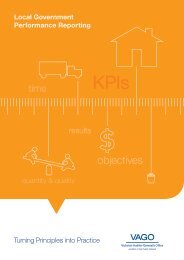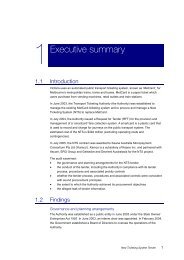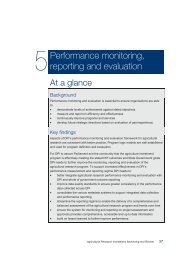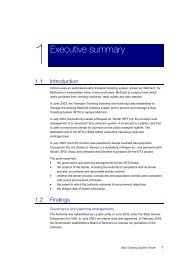Delivering HealthSmart Report - VAGO
Delivering HealthSmart Report - VAGO
Delivering HealthSmart Report - VAGO
You also want an ePaper? Increase the reach of your titles
YUMPU automatically turns print PDFs into web optimized ePapers that Google loves.
Executive summary<br />
Budget revision means greater subsidy by DHS<br />
DHS did not have a reliable basis for estimating ‘whole of life’ costs arising from the<br />
program, or for defining agency contributions.<br />
It also did not seek to identify whether agencies were able to meet their anticipated<br />
contributions.<br />
This means that DHS was in a position neither to accurately estimate the total cost of<br />
ownership of HealthSMART systems and infrastructure, nor to estimate what level of<br />
contribution should, or could, be made by health agencies.<br />
Revisions to the program budget were made in June 2006, resulting in DHS<br />
contributing an additional $35 million. This DHS cost escalation was made in<br />
recognition of the inability of agencies to meet the original DHS expectations of cocontributions.<br />
No source of sustainable ICT investment for health agencies<br />
The ability to plan and accommodate HealthSMART costs is dependent on the viability<br />
of individual health agencies. While some agencies have sufficient reserves to pay for<br />
their share of implementation expenses and ongoing costs, others have struggled.<br />
Adequate funding of ICT infrastructure within health agencies is an ongoing challenge<br />
within the sector, as ICT competes for funds with general medical equipment, which is<br />
given priority due to its clinical ‘patient facing’ usage.<br />
If the past patterns of ICT underinvestment continue, some agencies will not be able to<br />
keep their infrastructure up to date and are at risk of not fully benefiting from the<br />
investments made through the HealthSMART program.<br />
Delays mean greater subsidy of shared services<br />
Delays in implementation of applications will mean that the HealthSMART shared<br />
services arrangement will have to be subsidised by an extra $61 million until enough<br />
agencies have implemented HealthSMART applications.<br />
This could divert significant funds from DHS service delivery budgets and lead to<br />
underutilisation of a strategic whole-of-sector ICT asset.<br />
Recommendations<br />
• DTF and DHS should work with the VPHS implementing agencies to develop<br />
an evidence-based business case, in line with current better practice<br />
guidance, to better assure the effective delivery of the incomplete components<br />
of the HealthSMART program.<br />
6 <strong>Delivering</strong> HealthSMART — Victoria's whole-of-health ICT strategy




